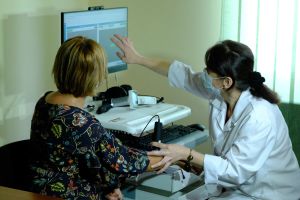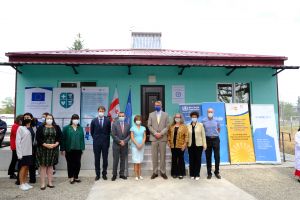
Minimizing the impact of the COVID-19 outbreak in Georgia through telemedicine and digital health solutions
Project Description
WHO, UNFPA, UNICEF, UNOPS team up to advance digital solutions to health in rural areas. The project protects and promotes people’s health and well-being, improves access to essential health services and reduces burden on the healthcare system during COVID-19 pandemic and beyond. It builds on, and is complementary to, ongoing EU and UN support to Georgia’s COVID-19 response and progress towards universal health coverage.
The focus is to introduce new service delivery approaches into the rural public healthcare system, such as telemedicine and telecare, and improving the capacity of rural doctors to provide quality primary healthcare services through tele-education. Modern, easy to handle digital technologies also help public health services to improve surveillance, data management and contact tracing. The project helps Georgia to be well equipped/positioned to not only address current emergency health challenges but also future needs while moving towards universal health coverage.
The focus is to introduce new service delivery approaches into the rural public healthcare system, such as telemedicine and telecare, and improving the capacity of rural doctors to provide quality primary healthcare services through tele-education. Modern, easy to handle digital technologies also help public health services to improve surveillance, data management and contact tracing. The project helps Georgia to be well equipped/positioned to not only address current emergency health challenges but also future needs while moving towards universal health coverage.
Specific Objective
The project contributes to reducing the negative impact of the COVID-19 pandemic on the health of the population and health care system, helps to build a resilient and robust public healthcare system with telemedicine capacities to ensure equitable access to services for people in remote areas, and contributes to progress towards universal health coverage. It:
- Strengthens technical capacities of the Georgian health care system to provide equitable telemedicine services, including for the effective prevention, preparedness for, detection and response to the COVID-19 pandemic;
- Promotes telemedicine solutions through training, communication and legislative amendments, to enable better, more effective and coordinated response to COVID-19;
- Increases public awareness on prevention of COVID-19 and telemedicine solutions.
- Strengthens technical capacities of the Georgian health care system to provide equitable telemedicine services, including for the effective prevention, preparedness for, detection and response to the COVID-19 pandemic;
- Promotes telemedicine solutions through training, communication and legislative amendments, to enable better, more effective and coordinated response to COVID-19;
- Increases public awareness on prevention of COVID-19 and telemedicine solutions.
Expected Results
Short-term results:
• 200 village ambulatory care facilities furnished with basic tools, including equipment to manage mild cases of COVID-19 and to provide pregnancy and early child development health services.
• 50 rural health facilities fit out with telemedicine equipment to address major non-communicable diseases including diabetes, hypertension and chronic respiratory diseases.
• Telecare platform developed and capacity increased to deliver remote health services.
• Enhanced online training and communication platform developed for primary health care providers.
• Health-care professionals trained on the use of telemedicine services for delivery of non-communicable disease, early child development and sexual and reproductive health services.
• Comprehensive legal and regulatory framework for the development of telemedicine in Georgia developed, including for the ethical use of digital health technologies.
• COVID-19 surveillance enhanced through digital tools, for improved contract tracing and data management.
• Increased public awareness and health literacy on COVID-19 prevention and telemedicine solutions, including among parents and caregivers, enabling them to lead healthier, safer lives.
• Increased uptake of telemedicine solutions by health workers and population through targeted campaigns supported.
Medium- and long-term results:
• Improved capacity of rural health workers to deliver quality PHC services through tele-health.
• Improved health information system, including data collection and analysis, health reporting, knowledge and information sharing.
• Resilient primary health care in rural areas with telemedicine capacities to maintain essential health services without disruptions, and to advance universal health coverage.
• Strengthened health care system in Georgia that provides equitable telemedicine services to detect, protect, respond to and recover from COVID-19 and other health emergencies.
• 200 village ambulatory care facilities furnished with basic tools, including equipment to manage mild cases of COVID-19 and to provide pregnancy and early child development health services.
• 50 rural health facilities fit out with telemedicine equipment to address major non-communicable diseases including diabetes, hypertension and chronic respiratory diseases.
• Telecare platform developed and capacity increased to deliver remote health services.
• Enhanced online training and communication platform developed for primary health care providers.
• Health-care professionals trained on the use of telemedicine services for delivery of non-communicable disease, early child development and sexual and reproductive health services.
• Comprehensive legal and regulatory framework for the development of telemedicine in Georgia developed, including for the ethical use of digital health technologies.
• COVID-19 surveillance enhanced through digital tools, for improved contract tracing and data management.
• Increased public awareness and health literacy on COVID-19 prevention and telemedicine solutions, including among parents and caregivers, enabling them to lead healthier, safer lives.
• Increased uptake of telemedicine solutions by health workers and population through targeted campaigns supported.
Medium- and long-term results:
• Improved capacity of rural health workers to deliver quality PHC services through tele-health.
• Improved health information system, including data collection and analysis, health reporting, knowledge and information sharing.
• Resilient primary health care in rural areas with telemedicine capacities to maintain essential health services without disruptions, and to advance universal health coverage.
• Strengthened health care system in Georgia that provides equitable telemedicine services to detect, protect, respond to and recover from COVID-19 and other health emergencies.
Project map
Photo gallery
Official Launch of the Project
Videos
How Telemedicine can help providing childcare services
How Telemedicine Works in rural areas - Example of Amamlo Village
PROJECT DETAILS
Georgia
Priority Area:
Partnership that protects, Partnership that creates, Partnership that connects Subsector:
Governance & public administration, Economy & trade, Digital (broadband, mobile, eGov, digital innovation, cyber) Topic:
Health, COVID-19, Digital Project Status:
Completed Start Date:
13.08.2021 End Date:
31.08.2025 EU Project Number:
426-264 
